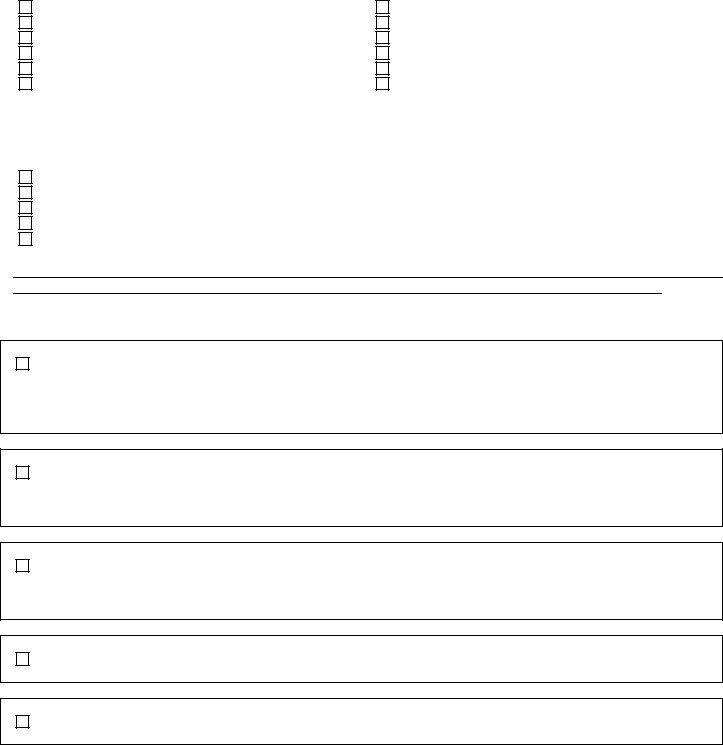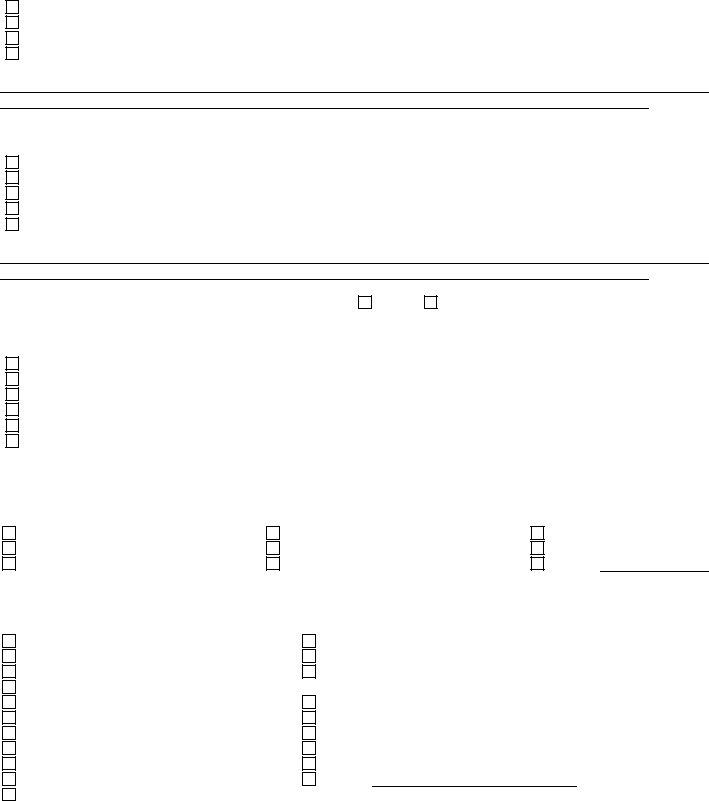The MAP-620 form, a comprehensive document designed to evaluate and facilitate the application for individuals seeking Supports for Community Living (SCL) waiver and Intermediate Care Facilities for Individuals with Intellectual Disabilities (ICF/MR) services, stands as a crucial starting point for many seeking tailored support and care within the state of Kentucky. Through an intricate compilation consisting of personal details, medical history, mobility and communication abilities, daily living skills, healthcare needs, and current living situation, this form captures the essence of the applicant's current status and future needs. It delves into specifics such as potential behavior issues, the requirement for nursing services, and the frequency of doctor visits, ensuring a holistic overview is provided. The form does not end with the individual's immediate medical and physical needs; it further explores anticipated service requirements, preferences for future living arrangements, and the dynamics of the caregiving relationship. By requiring signatures from both the applicant and a legal representative or guardian, the MAP-620 form underscores the importance of a corroborated and carefully considered application process, paving the way for tailored services that align closely with the unique needs and preferences of each applicant. The detailed structure of the form, from demographic information to specifics about daily needs and long-term care plans, reflects a thoughtful approach towards ensuring that individuals with developmental and intellectual disabilities receive the most fitting and supportive care available.
| Question | Answer |
|---|---|
| Form Name | Form Map 620 |
| Form Length | 4 pages |
| Fillable? | No |
| Fillable fields | 0 |
| Avg. time to fill out | 1 min |
| Other names | scl_app scl waiver and icfmr services form map 620 |

|
|
|
|
|
|
|
|
|
|
|
Page 1 |
||||||
|
|
|
|
APPLICATION FOR SCL WAIVER AND ICF/MR SERVICES |
|
|
|||||||||||
|
|
|
|
|
Read attached instruction sheet before completing this application |
|
|
||||||||||
|
|
|
|
|
|
|
|
Section 1 |
|
|
|
|
|
|
|||
|
|
|
|
|
|
|
|
|
|
Sex: M |
or F |
||||||
|
|
|
|
|
|
|
|
|
|
|
|
|
|
|
|||
|
Name: |
|
|
|
|
|
|
|
|
|
|
|
|
|
|
|
|
|
|
|
First |
|
Middle |
Last |
|
|
|||||||||
|
Social Security Number |
|
|
|
|
Medical Assistance Number |
|
|
|
||||||||
|
Date of Birth |
|
|
|
|
|
|
|
Phone #: |
|
( ) - |
|
|
||||
|
|
|
month |
day |
year |
|
|
|
|
|
|||||||
|
Present Address: |
|
|
|
|
|
|
|
|
|
|
|
|
|
|||
|
|
|
|
|
street |
|
|
|
|
|
|
|
|
|
|
|
|
|
|
|
|
|
|
|
|
KY |
|
|
|
|
|
|
|
||
|
|
city |
|
|
County |
|
|
State |
|
Zip Code |
|
|
|||||
|
|
|
|
|
|
|
|
|
|
|
|
|
|
|
|
|
|
Section 2
Legal Representative/Guardian
Address
KY
|
city |
County |
State |
|
Zip Code |
|
||
Phone |
|
|
Relationship to Applicant |
|
|
|
|
|
|
|
|
|
|
|
(Ex: mother, father, friend) |
|
|
Legal Rep./Guardian Signature |
|
|
|
Date |
|
|
||
`
Case Management Provider Name And Address
Name:
Address:
Section 3
City |
County |
State |
Zip Code |
Phone Number |
Section 4
DSM Diagnosis:
Axis I (Mental Health):
Axis II (Mental Retardation/Developmental Disability):
Axis III: (Physical Health):
Age Disability Identified:
|
|
|
|
|
|
|
|
SCL Waiver |
|
|
Physician/QMRP Signature |
|
Date |
||||||
|
|
|
|
|
|
|
|
ICF/MR |
|
|
CMHC MR/DD Director Signature |
|
Date |
||||||
|
|
|
|
|
|
|
|
|
|
|
|
|
|
|
Section 5 |
|
|
|
|
|
|
|
|
|
|
|
|
||
|
|
|
|
|
|
|
|
|
|
|
Applicant’s Signature |
|
|
Date |
|||||
|
|
|
|
|
|
|
|
|
|
|
|
|
|
|
|
|
|
|
|

|
|
|
Page 2 |
|||
|
|
|
|
|
||
|
PLEASE TELL US BOUT THE APPLICANT BY CHECKING ONE BOX UNDER EACH HEADING. |
|||||
|
|
|
|
|
|
|
|
6. MOBILITY |
|
7. COMMUNICATION |
|||
|
Walks independently |
|
|
Speaks and can be understood |
||
|
Walks with supportive devices |
|
|
Speaks and is difficult to understand |
||
|
Walks unaided with difficulty |
|
|
uses gestures |
||
|
Uses wheelchair operated by self |
|
|
Uses Sign language |
||
|
Uses wheelchair & needs help |
|
|
Uses communication board or device |
||
|
No mobility |
|
|
Does not communicate |
||
|
Comments |
|
|
Comments: |
||
|
|
|
|
|
|
|
8.HOW MUCH TIME IS REQUIRED FOR ASSURING SAFETY?
Requires less than 8 hours per day on average Requires
Requires 24 hours (does not require awake person overnight Requires 24 hours with awake person overnight
Extreme Need: Requires 24 hours, awake person trained to meet individual’s particular needs; continuous monitoring
COMMENTS:
9.HOW MUCH ASSISTANCE IS NEEDED FOR DAILY LIVING TASKS (Choose only ONE box)
No assistance needed in most
Minimal assistance (use of verbal prompts or gestures as reminders) needed in some
Minimal to complex assistance needed to complete complex skills such as financial planning and health planning
No assistance in some
Minimal assistance for many skills, and
Complete assistance (caregiver completes all parts of task) needed in some basic skills and all complex skills.
Partial (use of hands on guidance for part of task) to complete assistance needed in most areas of
Cannot complete complex skills.
Partial to complete assistance is needed in all areas of
Extreme need: All tasks must be done for the individual, with no participation from the individual

Page 3 |
10. HOW OFTEN ARE DOCTOR VISITS NEEDED?
For routine health care only / once per year
Extreme need: Chronic medical condition requires immediate availability and frequent monitoring
COMMENTS:
11. HOW OFTEN ARE NURSING SERVICES NEEDED?
Not at all
For routine healthcare only
Extreme Need: Several times daily or continuous availability
COMMENTS:
12. ARE THERE BEHAVIORAL PROBLEMS? |
Yes |
No
IF
Aggressive toward others
Inappropriate sexual behavior
Property destruction
Life threatening (threat of death or severe injury to self or others)
Take prescribed medications for behavior control
PLEASE CHECK ONE ANSWER UNDER EACH QUESTION, UNLESS OTHERWISE INDICATED
13 WHERE IS THE INDIVDUAL CURRENTLY LIVING?
Living with family/relative
Group home or personal care home ICF/MR (Intermediate Care Facility)
Living in own home or apartment Nursing Home
Living with a friend
Foster Care
Psychiatric Facility
Other:
14DOES THE INDIVIDUAL CURRENTLY RECEIVE ANY OF THE FOLLOWING SERVICES? (CHECK ALL THAT APPLY)
Supported Living
Medicaid Acquired Brain Injury
Supported Employment
Home Health
Other Medicaid Services
Day Program
School
Behavior Support
Transportation
Speech Therapy
Physical Therapy
Medicaid EPSDT (if under 21)
Medicaid Home & Community Based Waiver Mental Health Counseling or Medication for a mental health condition
In home support Residential Respite Occupational Therapy Case Management Other

Page 4 |
15 WHAT SERVICES ARE NEEDED NOW OR IN THE FUTURE?
Day Program
School
Respite
Transportation
Speech Therapy
Physical Therapy
In home support Residential Behavior Support Occupational Therapy Case Management Supported Employment
16THE FOLLOWING ARE 5 CHOICES FOR FUTURE LIVING ARRANGEMENTS. WHERE WOULD THE APPLICANT PREFER TO LIVE IN THE FUTURE? CHOOSE ONLY ONE (1):
At home with a family member with someone to come in and help
In the person’s own home with minimal support
In a 24 hour staffed residence in the community
In a 24 hour supervised family home in the community
In a 24 hour staffed group home in the community
In an ICF/MR
17 WHO IS THE PRIMARY CAREGIVER? (If staff, do not answer questions 18 & 19)
Mother |
Father |
Grandmother |
Grandfather |
Aunt |
Sister |
Brother |
Friend |
Neighbor |
Other: Who? |
18 WHAT IS THE AGE OF THE PRIMARY CAREGIVER
Uncle
Staff
Less than 30 years old
19 THE PRIMARY CAREGIVER’S HEALTH STATUS COULD BE CLASSIFIED AS:
Poor |
Stable |
Good |
Very Good |
COMMENTS:
Person Completing this Application
Print Name
Relationship to Individual (if not individual)
Phone Number
Signature |
Date |
Additional Comments:
Mailto: The Division of Mental Retardation, 100 Fair Oaks Lane,